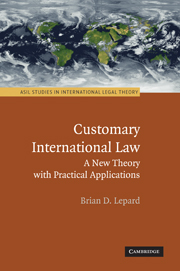Book contents
- Frontmatter
- Contents
- Figures
- Acknowledgments
- Cases
- PART ONE THE ENIGMAS OF CUSTOMARY INTERNATIONAL LAW
- PART TWO FOUNDATIONS OF A NEW THEORY OF CUSTOMARY INTERNATIONAL LAW
- PART THREE RESOLVING THE CONCEPTUAL ENIGMAS OF CUSTOMARY INTERNATIONAL LAW
- 6 Toward a New Normative Theory of Customary International Law
- 7 A New Understanding of Opinio Juris
- 8 The Function of the State Practice Requirement
- 9 Ethics and Customary International Law
- 10 Democratic Principles and Customary International Law
- 11 The Relationship Between Customary International Law and General Principles of Law
- PART FOUR RESOLVING THE PRACTICAL ENIGMAS OF CUSTOMARY INTERNATIONAL LAW
- PART FIVE SOME APPLICATIONS OF THE THEORY
- PART SIX THE FUTURE OF CUSTOMARY INTERNATIONAL LAW
- Bibliography
- Index
8 - The Function of the State Practice Requirement
Published online by Cambridge University Press: 05 June 2012
- Frontmatter
- Contents
- Figures
- Acknowledgments
- Cases
- PART ONE THE ENIGMAS OF CUSTOMARY INTERNATIONAL LAW
- PART TWO FOUNDATIONS OF A NEW THEORY OF CUSTOMARY INTERNATIONAL LAW
- PART THREE RESOLVING THE CONCEPTUAL ENIGMAS OF CUSTOMARY INTERNATIONAL LAW
- 6 Toward a New Normative Theory of Customary International Law
- 7 A New Understanding of Opinio Juris
- 8 The Function of the State Practice Requirement
- 9 Ethics and Customary International Law
- 10 Democratic Principles and Customary International Law
- 11 The Relationship Between Customary International Law and General Principles of Law
- PART FOUR RESOLVING THE PRACTICAL ENIGMAS OF CUSTOMARY INTERNATIONAL LAW
- PART FIVE SOME APPLICATIONS OF THE THEORY
- PART SIX THE FUTURE OF CUSTOMARY INTERNATIONAL LAW
- Bibliography
- Index
Summary
STATE PRACTICE AS EVIDENCE OF OPINIO JURIS
I proposed in Chapter 6 that, consistent with the revised definition of opinio juris, the state practice requirement should be viewed as mandating appropriate evidence that states believe that a particular legal rule is desirable now or in the near future. In some cases, depending on the context of the issue involved, consistent state practice will be a very important indicator of this belief; however, for other issues it will not be. The role and importance of consistent state practice will depend on how states view the issue governed by the putative legal norm and the particular bases of obligation that they believe may apply and that they are evaluating in considering the desirability of implementing the norm.
Thus, we must draw careful distinctions among different kinds of norms based on how states perceive the issue to which they relate. It is therefore not appropriate to conclude that strong evidence of opinio juris can always “compensate” for weak consistency in state practice, and vice versa, as some scholars appear to maintain.
In some cases, consistent and widespread state practice will be less important as evidence of opinio juris. One such case is when states believe that it is desirable to recognize a norm as obligatory primarily to preserve the vital interests or existence of the global community of states. This is because states view the norm as directly promoting the interests of that community.
- Type
- Chapter
- Information
- Customary International LawA New Theory with Practical Applications, pp. 122 - 139Publisher: Cambridge University PressPrint publication year: 2010



